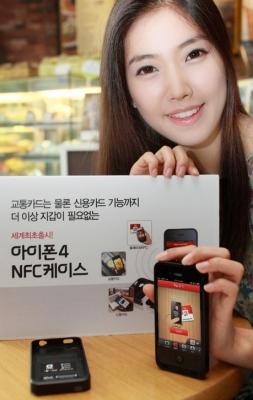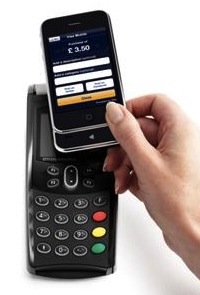Korean Telco to Roll Out NFC Attachment for iPhone

South Korean mobile operator KT Corp. is launching a small rollout of NFC services on Apple’s iPhone 4, using an attachment called iCarte that contains a full NFC chip.
The telco, South Korea’s second largest mobile operator, plans to enable payment applications from a few of Korea’s largest credit card companies, including Shinhan Card. The devices also will support a prepaid transit card account and KT’s NFC mobile wallet, olleh touch.
With the NFC add-on, made by Canada-based Wireless Dynamics, the iPhone joins the NFC-enabled Samsung Galaxy S II and three other NFC phones in KT’s small but growing portfolio of handsets supporting NFC.
The operator said it will put the iPhone attachment on sale at KT agents nationwide and in stores that sell Apple products, as well as on Shinhan Card’s shopping Web site, among others distributors.
KT, which until March had an exclusive deal with Apple to distribute the iPhone in South Korea, has 1.9 million subscribers with iPhones and plans to sell more than 25,000 of the iCarte attachments, a source connected with the launch told NFC Times.
The telco launched NFC last fall with a Samsung feature phone, the SHW-A170K, enabling KT to stake its claim to being the first mobile operator worldwide to commercialize NFC services, though the launch was small.
Then last spring, the operator introduced the NFC version of the popular Android-based Galaxy S II from Samsung. KT added two other NFC-enabled Android smartphones from another South Korea-based handset maker, Pantech–the Vega Racer and Vega No.5. The latter is a “tabletphone” with a 5-inch screen. KT also has introduced an Android NFC phone, the KM-S220, from its own phone-making subsidiary, KT Tech.
A KT source told NFC Times the telco has about 200,000 NFC users, though it’s unclear how often they tap their phones for payments or other services.
KT is seeking to remain a leader of the early NFC rollouts. It ordered the first Galaxy S II phones with an NFC chip inside. Samsung has shipped non-NFC versions of the flagship phone elsewhere, though is reportedly beginning to ship the NFC version in North American and Europe this fall.
The iPhone, a popular seller for KT, is not expected to support NFC with a built-in chip until next year. That’s why KT is using the NFC bridge technology, Wireless Dynamics’ iCarte, to enable the smartphone for NFC.
“With the recent launch of NFC-enabled smart(phones), iPhone users were showing increasing needs for NFC services,” Hyunmi Yang, executive vice president for integrated customer strategy at KT, said in a statement. “As a global leader of NFC services, KT plans to provide more convenient and differentiated NFC services to its customers.”
 The iCarte to date has only been trialed in Turkey, by mobile operator Turkcell and bank Yapı Kredi, which launched a payment pilot earlier this year using a Visa payWave application. Visa Europe employees also conducted an internal trial of the attachment in the United Kingdom.
The iCarte to date has only been trialed in Turkey, by mobile operator Turkcell and bank Yapı Kredi, which launched a payment pilot earlier this year using a Visa payWave application. Visa Europe employees also conducted an internal trial of the attachment in the United Kingdom.
And MasterCard Worldwide has trialed the device with its PayPass application in Asia, at least internally. Among others planning to trial the attachment with PayPass are Singapore’s EZ-Link Pte, mainly an issuer of the contactless electronic purse, ez-link, used for transit, along with some retail purchases. But EZ-Link also issues a MasterCard-branded prepaid card, called Fevo.
The iCarte attachment carries a full NFC chip along with a secure element, both from Netherlands-based NXP Semiconductors. It means the iCarte could be used to read tags and, possibly, conduct peer-to-peer communication.
But while KT is offering some tags in the box of the iPhone attachment, it’s mainly interested using the iCarte for card emulation.
The Shinhan Card application, supporting PayPass, will come preloaded on the iCarte’s secure chip and would be personalized over the air, NFC Times has learned. Two other credit card companies, Woori BC Card and KB Kookmin Card, plan to offer applications in October, according to KT. These applications probably will also support PayPass.
KT earlier this year bought a stake in credit card processor BC Card from Woori Bank, with the telco planning to take a cut of merchant fees when customers tap their phones to pay.
At the launch of the iPhone attachment, expected to be announced by KT today, the device will also carry the prepaid Cashbee transit card application, which enables users to tap to pay mass-transit fares in Seoul and other Korean cities. Cashbee also is accepted in Lotte retail stores, including 7-Eleven convenience stores in Korea.
KT and its partners plan to give subscribers incentives to buy the attachment. The consumers would get a Cashbee coupon worth 10,000 South Korean won (US$9) if they buy the device and 20,000 won if they activate the Shinhan Mobile Card preloaded on the chip.
It’s unclear how many point-of-sale terminals are able to accept the PayPass and Cashbee applications on the iCarte and KT’s full NFC phones, but all of the major mobile-payment players in South Korea are onboard with an effort to expand the NFC m-payment rollouts.
That includes KT’s chief rival, SK Telecom, along with Shinhan Card and BC Card, international payment networks and phone makers Samsung, LG and Pantech. The companies and other organizations in June formed the Grand NFC Korea Alliance.
The consortium, formed at the behest of government media regulator the Korean Communications Commission, hopes to tap into what officials project will be an NFC business opportunity worth more than US$1billion in coming years.
Among the goals of the group is to greatly expand the number of NFC-enabled phones and POS terminals available in the country.
The KT source told NFC Times that all handsets from Korean phone makers supporting 4G network technology LTE will include NFC chips. The phones, at least those distributed by KT, also will support applications on SIM cards via the single-wire protocol standard. The other NFC phones KT has already launched reportedly support the SWP standard, though the iPhone attachment does not. KT is reportedly planning to launch LTE later this year.












